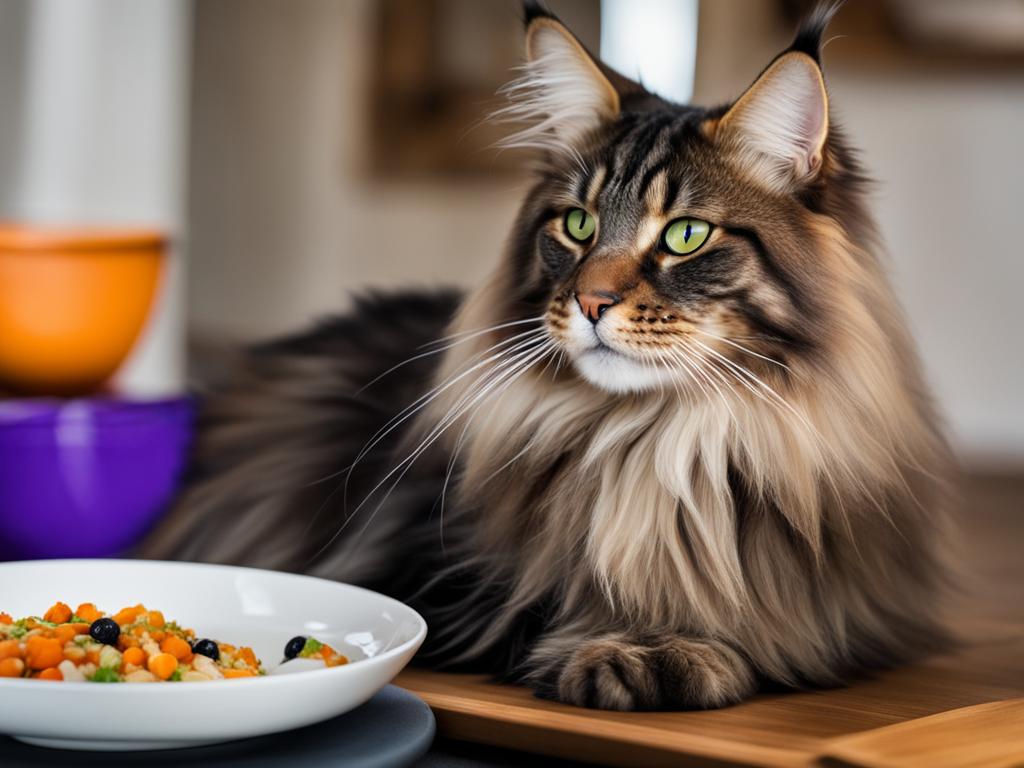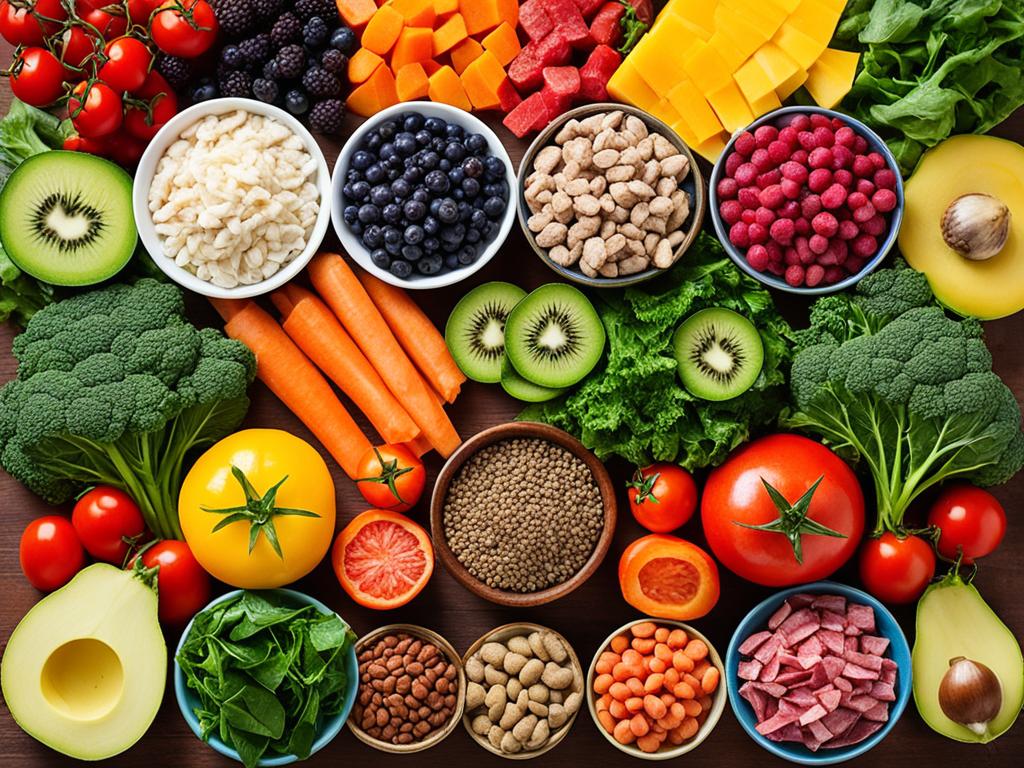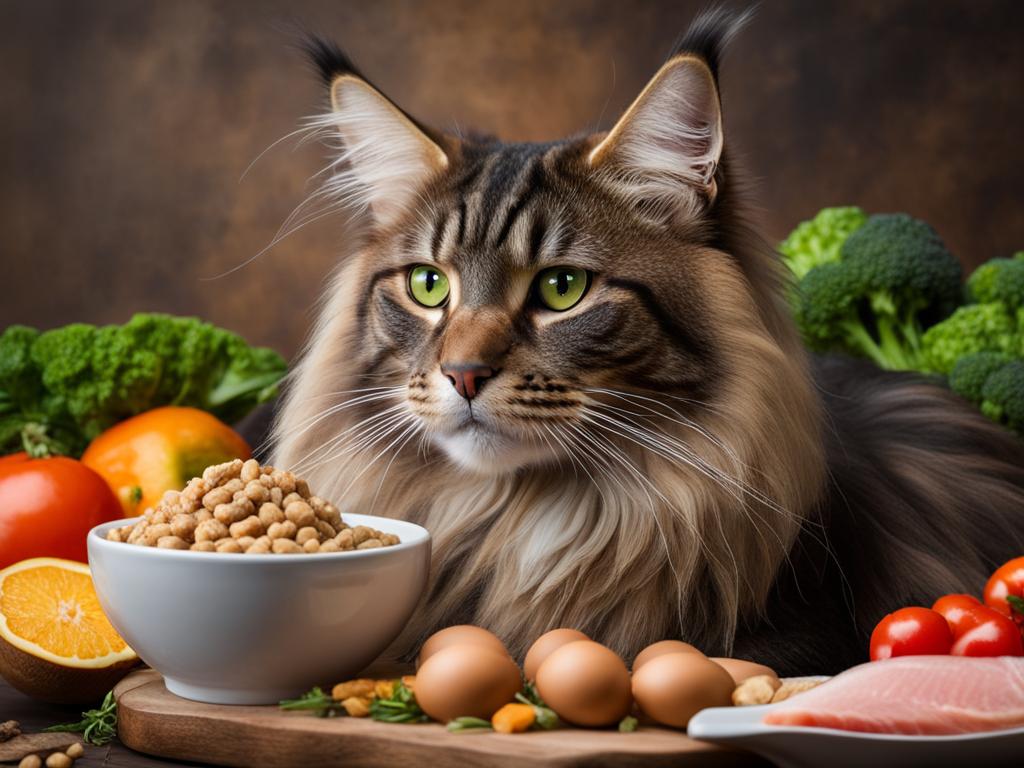Maine Coon cats have specific nutrition needs due to their size and unique characteristics. They are the largest of all cat breeds and can weigh between 9 to 18 pounds. While most cats reach maturity within their first year, Maine Coons take 3 to 5 years to fully grow. They are also prone to hip dysplasia. When choosing a diet for your Maine Coon, it is important to consider their protein requirements and ensure they receive a balanced mix of essential elements such as protein, carbohydrates, fats, fatty acids, amino acids, vitamins, and minerals.
The Association of American Feed Control Officials (AAFCO) provides minimum requirements for cat foods. While there are brands that market foods specifically for Maine Coon cats, research suggests that these foods do not make a significant difference in a cat’s health. It is important to choose a nutritionally balanced food that fits your budget and your cat’s taste.
Key Takeaways:
- Maine Coon cats have specific nutrition needs due to their size and unique characteristics
- Protein is the most important ingredient in a Maine Coon’s diet
- Choose cat foods that include real protein sources
- Consider your cat’s preferences when choosing wet or dry food
- Maine Coon cats have different nutritional requirements at different life stages
Choosing the Right Protein
Protein plays a vital role in the diet of a Maine Coon, particularly due to their large size. These magnificent cats require ample amounts of protein to support their growth and overall well-being. When selecting the ideal cat food for your Maine Coon, prioritize high-protein options that meet their specific nutritional needs.
Animal proteins derived from sources such as meat, chicken, and fish are highly beneficial for Maine Coons. These protein sources contain essential amino acids that promote muscle development and support their active lifestyle. Opt for cat foods that include real protein sources rather than those that contain “meal” or “by-products” to ensure your Maine Coon receives the highest quality protein.
While some pet owners opt for grain or gluten-free diets for their cats, it is important to note that these dietary restrictions are not essential unless your cat has a specific allergy or sensitivity. Focus on providing a balanced diet that includes a sufficient amount of protein, along with other essential nutrients.
Benefits of High-Protein Cat Food for Maine Coons
- Supports muscle growth and maintenance
- Aids in weight management
- Enhances energy levels and activity
- Promotes a healthy coat and skin
- Strengthens the immune system
Remember, the most important factor when choosing the right protein for your Maine Coon is to ensure that your cat enjoys the taste of the food and is willing to eat it. Every cat has individual preferences and tastes, so consider their likes and dislikes when making a decision.
Choosing the right protein is a crucial part of providing a balanced diet for your Maine Coon. By prioritizing high-protein cat food and including animal protein sources in their diet, you can support their unique nutritional needs and help them thrive.
Wet vs. Dry Food
When it comes to feeding your Maine Coon, choosing between wet and dry food is a decision that should be based on your cat’s preferences and specific needs. Both options have their advantages and can contribute to a balanced diet for your furry friend.
Many cat owners prefer dry food because of its convenience. Dry food is easy to prepare, serves as a complete meal, and allows your Maine Coon to use their teeth while chewing. It also has a longer shelf life and is generally more affordable, making it a budget-friendly choice.
On the other hand, wet food offers a higher moisture content, which can be beneficial for cats that may struggle to drink enough water on their own. This is especially important for Maine Coons as they are prone to kidney issues as they age. Wet food can help maintain proper kidney function and overall hydration.
**Image:**

One approach is to provide a mix of wet and dry food to your Maine Coon. This way, you can offer them the benefits of both options and keep their mealtimes interesting. The wet food can be given as a standalone meal or used as a topper to enhance the flavor and encourage your cat to eat.
It’s always a good idea to consult with your veterinarian to determine the best feeding option for your Maine Coon. They can assess your cat’s individual needs and provide guidance on the appropriate balance between wet and dry food. Additionally, they can recommend specific brands and formulas that are suitable for large breed cats like Maine Coons.
Meeting Life Stage Specific Needs
Just like humans, cats have different nutritional requirements at various stages of life. Maine Coon kittens, in particular, require special attention to ensure their optimal growth and development. It is recommended to feed them a formula specifically designed to meet their nutritional needs. Additionally, it is advisable to keep them on kitten food for a longer period due to their slower maturity rate compared to other cat breeds.
As Maine Coons age, their nutritional needs change. Senior cats have different dietary requirements, and there are specially formulated foods available for older cats. These foods take into consideration the specific health concerns that older cats might face, such as joint health or digestion issues.
Indoor cats, including Maine Coons, may have lower activity levels than their outdoor counterparts. This means they may require fewer calories to maintain a healthy weight. It is important to monitor your Maine Coon’s weight and adjust their feeding amounts accordingly.
To ensure your Maine Coon receives the proper nutrition at every life stage, it is always recommended to consult with your veterinarian. They can provide guidance on the appropriate amount of food to feed your Maine Coon based on their specific needs and ensure they are on the right track for a healthy and fulfilling life.
Avoiding Overfeeding and Obesity
Maine Coons are known for their large appetite, but overfeeding can lead to obesity and related health issues. It is important to feed your Maine Coon the correct amount of food to maintain a healthy weight. The caloric requirements for a Maine Coon depend on their body weight and activity level. Feeding high-quality, balanced food and avoiding excessive treats or snacks can help prevent overfeeding. Regular exercise and playtime are also important to keep your Maine Coon active and maintain a healthy weight.
Tips to Avoid Overfeeding and Obesity:
- Measure your Maine Coon’s food portions to ensure they receive the right amount of calories for their weight and activity level.
- Consult with your veterinarian for personalized feeding recommendations.
- Avoid free-feeding and establish a feeding schedule to control portion sizes.
- Avoid feeding excessive treats or table scraps, as these can contribute to weight gain.
- Monitor your Maine Coon’s weight regularly and make adjustments to their diet as needed.
- Ensure your Maine Coon gets regular exercise through playtime and interactive toys.
By following these tips, you can help your Maine Coon maintain a healthy weight and reduce the risk of obesity-related health problems. Remember to choose the best cat food for Maine Coon breeds that offers a well-balanced and nutritionally complete diet to support their overall health.

The Optimum Maine Coon Diet
The ideal diet for a Maine Coon should consist of high-quality, wet food that is rich in animal protein and low in fat and carbohydrates. Meat or fish should be the primary ingredient in the food, providing all the essential amino acids and nutrients that cats need. It is important to choose natural ingredients and avoid fillers such as grains, cereals, and vegetables that cats have difficulty digesting. The food should also contain the right balance of nutrients for optimal health. Untamed is a recommended brand that offers wet food options specifically tailored to the nutritional needs of Maine Coon cats.
Benefits of the Optimum Maine Coon Diet:
- High-quality animal protein supports muscle development and maintenance for the large size of Maine Coon cats.
- Low fat and carbohydrate content helps prevent obesity, which is common among Maine Coons.
- Natural ingredients and absence of fillers support better digestion and reduce the risk of allergies or sensitivities.
- Balanced nutrients ensure overall health and well-being in Maine Coon cats.
| Benefits | Untamed Wet Food |
|---|---|
| High-quality animal protein | ✓ |
| Low fat | ✓ |
| Low carbohydrate | ✓ |
| Natural ingredients | ✓ |
| No fillers | ✓ |
| Balanced nutrients | ✓ |

Making the Right Choice for Your Maine Coon
Choosing the right cat food for your Maine Coon can be a daunting task, given the plethora of options available in the market. To ensure that your beloved feline friend receives the best nutrition, it is crucial to select a cat food that is specifically designed for large breeds and meets their unique dietary requirements.
When making your decision, consider the protein content of the cat food. Maine Coons, being large cats, require a higher amount of protein in their diet to support their muscle growth and overall health. Look for cat foods that have animal protein as the primary ingredient, such as real meat, chicken, or fish.
Additionally, pay attention to the quality of ingredients used in the cat food. Opt for brands that use natural ingredients and avoid fillers such as grains and vegetables, as these can be difficult for cats to digest. By choosing a cat food that is free from artificial colors, flavors, and preservatives, you can ensure that your Maine Coon receives a nutritionally balanced diet.
If your Maine Coon has any known allergies or sensitivities, it is important to select a cat food that is free from potential allergens. Consult with your veterinarian for personalized recommendations based on your cat’s specific needs and consider performing an elimination diet if necessary.
To keep your Maine Coon healthy, also monitor their weight and adjust their feeding amounts accordingly. While Maine Coons have a hearty appetite, overfeeding can lead to obesity and associated health problems. Follow the feeding guidelines provided by the cat food manufacturer and consult with your vet to determine the appropriate portion sizes based on your cat’s activity level and body condition.
FAQ
What are the specific nutrition needs of a Maine Coon?
Maine Coons have unique nutrition needs due to their large size. They require a balanced mix of essential elements such as protein, carbohydrates, fats, fatty acids, amino acids, vitamins, and minerals.
How important is protein in a Maine Coon’s diet?
Protein is the most important ingredient in a Maine Coon’s diet due to their size. Animal proteins from sources such as meat, chicken, and fish are preferable to plant proteins.
Should I choose wet or dry food for my Maine Coon?
The choice between wet and dry food is a matter of preference. Dry food allows the cat to use their teeth while eating, while wet food has a higher moisture content, which is important for cats that may not drink enough water on their own.
Are there specific nutritional requirements for different life stages of Maine Coon cats?
Yes, just like humans, cats have different nutritional requirements at various stages of life. Maine Coon kittens should be fed a formula designed specifically for their needs, while senior cats have different needs that can be addressed with specially designed foods.
How can I prevent overfeeding and obesity in my Maine Coon?
Overfeeding can lead to obesity and related health issues in Maine Coons. It is important to feed them the correct amount of high-quality, balanced food and avoid excessive treats or snacks. Regular exercise and playtime are also important to maintain a healthy weight.
What is the ideal diet for a Maine Coon?
The ideal diet for a Maine Coon should consist of high-quality, wet food that is rich in animal protein and low in fat and carbohydrates. Meat or fish should be the primary ingredient in the food, providing all the essential amino acids and nutrients that cats need.
How do I choose the right food for my Maine Coon?
When choosing food for your Maine Coon, consider the protein content, quality of ingredients, and any potential allergens or sensitivities. Consult with your vet for personalized recommendations based on your cat’s specific needs.

Leave a Reply